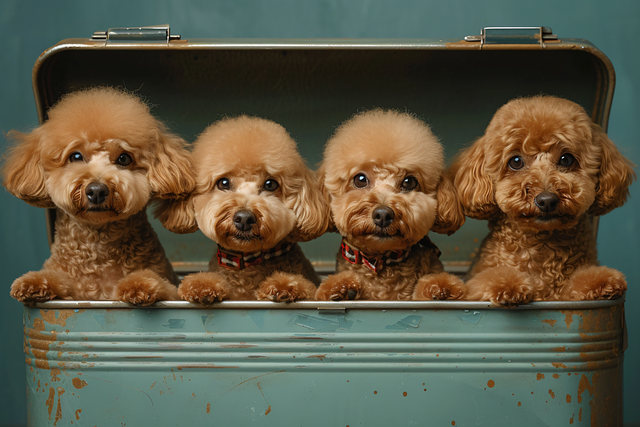
What is glaucoma in a dog?
You might notice your dog squinting more at mealtime or avoiding bright sunlight—these small changes could be early signs of a serious eye condition.
You walk into the kitchen and that familiar, unwelcome smell hits you. Uh oh. A puddle (or worse) on the floor. But your furry culprit? Wagging their tail, begging for breakfast like nothing's wrong. It’s a head-scratcher, right? Seeing your dog with diarrhea while they bounce around like their usual self is confusing, but thankfully, often manageable at home. Let’s unravel why this happens and what you should do.
The canine gut is surprisingly sensitive. Think about what your dog might have sampled yesterday: a sudden treat change, scavenged leftovers during your neighborhood walk (we’ve all been there!), stress from that noisy thunderstorm, or even excitement seeing the dog park. These common triggers can irritate the digestive lining, causing fluid to rush through without absorbing properly – hello, diarrhea! Their energy stays high because the underlying issue often isn't systemic illness yet, just localized gut irritation. Think of it like a human having a mild stomach bug but still wanting to hang out.
So, what’s step one? Immediate dog diarrhea home care starts with a dietary reset. Skip the next meal or two – giving their gut a complete rest is crucial. Don’t worry about them starving; short fasting is therapeutic. Focus on hydration. Ensure fresh water is constantly available. Offer small licks of plain, low-sodium chicken or beef broth (cooled, of course) or ice cubes if they seem reluctant. This simple canine digestive health step prevents dehydration, the real danger with persistent runs. After the brief fast (12-24 hours max for adults, consult your vet sooner for puppies), reintroduce food very gently. A tablespoon or two of plain, boiled white rice mixed with boiled lean chicken (no skin, no bones!) or low-fat cottage cheese is the classic bland diet starter. Feed tiny portions every 3-4 hours for the first day back. Patience is key – rushing back to kibble often backfires spectacularly.

While managing this at home, remember your responsibilities as a pet owner. If you’re taking them out for essential potty breaks (even just your yard), public area poop scooping laws apply rigorously across the US and Europe. Always carry bags – double-bagging messy diarrhea is just part of the deal, especially in shared apartment courtyards or near playgrounds. Speaking of apartments, if that’s your home, be extra mindful of noise and disruption if your pup needs more frequent, urgent trips outside. A quick heads-up to understanding neighbors can go a long way! Also, double-check their core dog vaccinations are current. While diarrhea might just be dietary, ensuring they are protected against serious, contagious diseases like Parvovirus (which often starts with diarrhea) isn’t just smart care; it’s often legally required for licensing and boarding.
Crucially, watch for emergency vet signs. Even if they seem fine now, persistent diarrhea beyond 24-48 hours, blood (red or dark, tarry), vomiting, lethargy finally setting in, loss of appetite after the fast, obvious pain, or a fever (warm ears, dry nose aren't reliable; a rectal temp over 103°F is a vet call!) means pick up the phone immediately. Puppies and senior dogs are especially vulnerable and warrant quicker vet consultation. Remember, positive reinforcement dog training is always the gold standard. Never punish accidents – it creates fear and confusion, worsening anxiety-related tummy troubles. Focus on calmly cleaning up (enzyme cleaners are magic!) and rewarding them heavily when they go appropriately outside. Sometimes, the stress of being scolded causes the very problem you’re trying to fix. By understanding the triggers, acting calmly with home care, knowing your local obligations, and recognizing red flags, you can navigate this messy but common situation confidently, getting your pup’s tail – and tummy – truly back to happy.

You might notice your dog squinting more at mealtime or avoiding bright sunlight—these small changes could be early signs of a serious eye condition.

Let’s set the scene: It’s a sweltering Phoenix afternoon—105°F outside—and you rushed your 2-year-old Lab mix, Cooper, on a quick walk to “get it over with.”

Let’s get real: You’re in your Miami apartment, watching your 3-year-old Corgi, Loki, struggle to climb the stairs to your second-floor unit.

Many dog owners brush off occasional scratching as just “dog behavior,” but persistent itching often signals something more—like a food allergy.

You might first notice your dog scratching more than usual—chewing at their paws until the fur looks thin, or rubbing their face against the couch nonstop.

Let’s be real: You’re standing in your Chicago apartment, watching your 3-year-old Beagle, Max, huff and puff just to climb onto the couch.